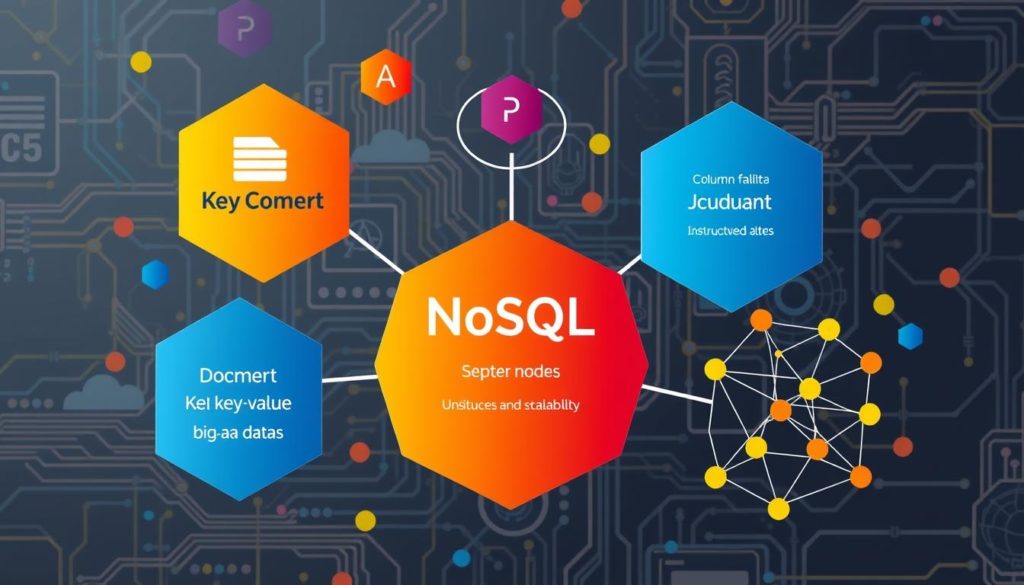
Did you know data volume has grown by 40% each year? This rapid growth shows we need databases that can handle big data easily. What is NoSQL database? NoSQL databases are a big step forward from traditional databases. They’re designed to tackle today’s data challenges.
If you’re curious about flexibility, scalability, and high availability, you’re in the right spot. We’ll explore NoSQL databases and their use cases in different fields.
Today, most data is unstructured. It comes from IoT devices, social media, and more. Traditional databases can’t keep up with this data. NoSQL databases offer the flexibility and performance needed for today’s apps.
We’ll show you what NoSQL databases are. We’ll cover their unique principles and why they’re crucial for businesses worldwide. We’ll also compare them to SQL databases, highlighting their strengths.
Are you ready to learn about the future of data storage? Let’s explore why NoSQL databases are essential for today’s data-driven businesses.
Key Takeaways
- Understand what a NoSQL database is and its core principles.
- Learn the importance of flexibility, scalability, and high availability in modern databases.
- Explore how NoSQL databases address challenges like data volume, data velocity, and data variety.
- Compare the advantages of NoSQL databases to traditional relational databases.
- Identify real-world applications and use cases through resources like this extensive guide.
- Recognize the evolving data requirements driving the adoption of NoSQL solutions.
Introduction to NoSQL Databases
NoSQL databases are new solutions for today’s data needs. They offer advantages over old databases. Let’s explore why they’re important.
Background and Evolution
NoSQL databases started because of the need for handling big amounts of data. Old databases, like MySQL, were not good for this. They were made for small, structured data.
NoSQL databases can handle many types of data. They use models like key-value and document. This makes them better for big data and real-time use.
MongoDB is a big name in NoSQL. It’s known for being flexible and easy to use. It stores data in JSON or key-value pairs, making it scalable.
Why NoSQL? The Need for Flexibility and Scalability
NoSQL databases are better than old ones because they’re flexible and scalable. They can handle different data types without strict rules. This makes managing data easier.
NoSQL databases are great at growing with your data. They can scale up or out, making them reliable. This is why they’re used in many fields.
Databases like MongoDB show NoSQL’s benefits. They’re fast, cost-effective, and agile. Some even support ACID transactions, making them more like old databases.
What is NoSQL Database
NoSQL databases have changed how we handle data. They offer flexibility, scalability, and high performance. Let’s explore what makes NoSQL databases so important for today’s apps.
Definition and Core Concepts
The NoSQL definition refers to databases for specific data models and apps. Unlike traditional databases, NoSQL uses non-relational models. This makes it flexible and ideal for quick app development.
Here are some NoSQL core concepts:
- Non-relational data models: Focus on specific data structures for better performance.
- Flexible schemas: Database design can change with app needs, speeding up development.
- Functional APIs and data types: Designed for specific data models, enhancing functionality.
- Horizontal scalability: Key-value databases handle large data volumes and scaling well.
Key Features and Characteristics
Understanding NoSQL database features shows why they’re chosen for certain apps. They offer high availability and low latency, great for real-time apps. NoSQL databases also support various data types and access patterns.
Key features include:
- Performance: Designed for specific data models, offering better performance than relational databases.
- Specific use cases: Ideal for IoT, mobile, web apps, and real-time personalization.
- Scalability: Supports horizontal scaling and handles large data volumes efficiently.
- Versatility: Offers a range of databases, from document to graph, for different app needs.
These features and NoSQL database features meet today’s app needs for high availability and performance. They’re great for blogging, e-commerce, real-time analytics, and fraud detection.
Types and Examples of NoSQL Databases
Exploring the types of NoSQL databases shows us a wide range of options. Each is made for different needs. We’ll look at Key-Value Stores, Document-Oriented Stores, Column-Oriented Stores, and Graph-Based Stores.
Key-Value Stores
Key-value NoSQL databases are simple, storing data as key-value pairs. They focus on quick data retrieval. This makes them great for caching and real-time apps.
Amazon DynamoDB is a well-known NoSQL example for fast responses. Redis and BerkeleyDB also offer high-performance storage.
Document-Oriented Stores
Document-oriented NoSQL databases, like MongoDB and CouchDB, store data in documents. These can be JSON or XML. They’re flexible and handle complex data well.
They’re perfect for user profiles and content management. Amazon DocumentDB makes it easy to scale and maintain MongoDB services.
Column-Oriented Stores
Column-oriented NoSQL databases, such as Amazon Keyspaces for Apache Cassandra and Google’s Bigtable, store data in columns. This design is efficient for large datasets.
They’re great for analytics and time-series data. Wide-column stores are scalable and flexible, ideal for big data needs.
Graph-Based Stores
Graph-based NoSQL databases store and query connected data. They use nodes and edges for entities and their relationships. This makes them perfect for social networks and fraud detection.
Amazon Neptune is a managed graph database service. It offers efficient querying for complex data.
Here’s a summary table of various NoSQL databases:
| Type | Characteristics | Examples | Use Cases |
|---|---|---|---|
| Key-Value Stores | Simple key-value pairs, fast retrieval | Amazon DynamoDB, Redis, BerkeleyDB | Content caching, session storage |
| Document-Oriented Stores | Schema-free, nested data structures | MongoDB, CouchDB, Amazon DocumentDB | User profiles, content management |
| Column-Oriented Stores | Data stored in columns, scalable | Amazon Keyspaces (Cassandra), Google Bigtable | Analytics, time-series data |
| Graph-Based Stores | Nodes and edges, connected data | Amazon Neptune | Social networks, recommendation engines |
Knowing about these types of NoSQL databases helps us choose the right one for our needs. This ensures our database performs well and scales as needed.
Benefits and Use Cases of NoSQL
NoSQL databases are great for handling lots of unstructured or semi-structured data. They offer many advantages over traditional SQL databases. Let’s look at these benefits and how they help in real-world applications, making NoSQL databases very useful in many industries.
Advantages Over Traditional SQL Databases
NoSQL databases are very flexible in how they store data. They can change as your data needs do. This is different from SQL databases, which have fixed structures.
NoSQL databases are also very fast and can grow as needed. They can handle more traffic by adding more servers. Big companies like Google and Amazon use NoSQL for its ability to manage huge amounts of data. Plus, NoSQL works well in the cloud, ensuring apps always run without stopping.
Another plus is NoSQL’s ability to scale horizontally and be always available. This is great for businesses with lots of data, like online games and e-commerce sites. NoSQL also makes sure data is always available by copying it across servers.
Real-World Applications
NoSQL databases are used in many areas, where traditional databases can’t keep up. For example, e-commerce sites use NoSQL to manage their products, customers, and sales. This makes shopping faster and more reliable for users.
Social media sites like Facebook and Twitter use NoSQL to store lots of posts and comments. NoSQL is perfect for handling complex data types. IoT devices also produce a lot of data, which NoSQL can manage well.
In gaming, NoSQL databases help manage player data, like profiles and progress. They provide the speed and scalability needed for a smooth gaming experience.
Big data analytics also benefits from NoSQL. It offers fast and flexible access to large amounts of unstructured data. This is key for making quick decisions based on real-time data.
| Industry | NoSQL Use Case | Benefits |
|---|---|---|
| E-commerce | Product catalogs and customer profiles | High performance, flexible data models |
| Social Media | Posts, comments, likes, shares | Handles complex data types, scalability |
| Gaming | Player data management | Scalable, real-time data handling |
| IoT | Real-time data from devices | Efficient data processing, horizontal scalability |
In summary, NoSQL databases offer many benefits, like flexible data models and scalability. These make them essential for today’s data-heavy applications. Using NoSQL can give you a competitive edge in the digital world.
Conclusion
NoSQL databases are changing how we manage data. They offer flexibility, scalability, and high performance. With different data models, they meet various needs, from storing hierarchical data to detecting fraud.
The future of NoSQL databases looks bright. They handle big amounts of unstructured data well. Businesses in finance, e-commerce, and more use them for real-time analytics and improving operations.
NoSQL databases are making a big impact. They help with content management and recommendation engines. By using them, companies can innovate, streamline, and stay agile. They are key to technological progress.
FAQ
What is a NoSQL database?
A NoSQL database is a type of database that doesn’t follow the traditional SQL rules. It’s flexible, scalable, and fast. Unlike SQL databases, NoSQL doesn’t need a fixed structure. This makes it great for handling big and diverse data sets.
How did NoSQL databases evolve?
NoSQL databases came about because companies needed to deal with more data and complex tasks. Traditional databases couldn’t handle it. So, NoSQL was born to offer scalability, flexibility, and speed for big data.
Why choose NoSQL over SQL?
NoSQL databases are better for many reasons. They scale horizontally, are flexible, and handle lots of unstructured data. These traits are perfect for today’s fast-paced apps that need to perform well.
What are the core concepts of NoSQL databases?
NoSQL databases are all about non-relational models and flexible schemas. They also offer various ways to query data. This makes them great for handling different data types and volumes.
What are the key features of NoSQL databases?
NoSQL databases are known for their ability to scale, flexibility, and high performance. They can handle many data types efficiently. This makes them ideal for managing large and changing datasets.
What are the main types of NoSQL databases?
There are several types of NoSQL databases. Key-Value Stores, Document-Oriented Stores, Column-Oriented Stores, and Graph-Based Stores. Each type is designed for specific needs, offering tailored solutions.
Can you give examples of NoSQL databases?
Yes, examples include Redis (Key-Value Store), MongoDB (Document-Oriented Store), Apache Cassandra (Column-Oriented Store), and Neo4j (Graph-Based Store). Each is great for different data and queries.
What are the benefits of using NoSQL databases?
NoSQL databases offer better scalability, flexible data models, and high performance. These benefits make them perfect for today’s data-intensive apps.
How are NoSQL databases used in real-world applications?
NoSQL databases power many applications, like social media, e-commerce, and big data analytics. They provide the agility and speed needed for managing vast amounts of data.
Future App Studios is an award-winning software development & outsourcing company. Our team of experts is ready to craft the solution your company needs.










